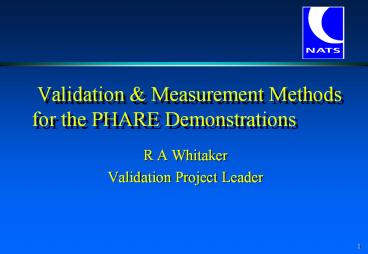Validation PowerPoint PPT Presentation
Title: Validation
1
Validation Measurement Methods for the PHARE
Demonstrations
- R A Whitaker
- Validation Project Leader
2
Analysis Is Not Easy!
3
Unreasonable Demands
4
Not Understood
5
Does Anyone Listen?
6
European Wide Validation
- NATS
- DLR
- CENA
- NLR
- EEC
7
European Wide Problems!
8
European Wide Solution
PHARE Validation Methodology
9
What is Validation?
- The process through which a desired level of
confidence in the ability of a deliverable to
operate in a real-life environment may be
demonstrated against a pre-defined level of
functionality, operability and performance - Validation builds confidence that the system is
fit for purpose
10
Methodology Matureswith Time
PC/TC PD1 PD2 PD2
PD3 PD1
PD1
11
PD1 Validation Planning
- Experimental Design
12
PHARE Experimental Design
- Comparison To Baseline
- For Users to Understand Results - Baseline must
be Close to Current System
13
PHARE Experimental Design
- Comparison To Baseline
- For Users to Understand Results - Baseline must
be Close to Current System - Progressive Introduction of Experimental
Variables in New Organisations
14
PHARE Experimental Design
- Comparison To Baseline
- For Users to Understand Results - Baseline must
be Close to Current System - Progressive Introduction of Experimental
Variables in New Organisations
15
PHARE Experimental Design
- Comparison To Baseline
- For Users to Understand Results - Baseline must
be Close to Current System - Progressive Introduction of Experimental
Variables in New Organisations
16
PD1 Validation Planning
- Experimental Design
- Identifying Data Collection
- Objective Data
- What How Format
- Subjective Data
- Questionnaires
- Debriefs
- Concentration on Controller Workload
- Instantaneous Self Assessment (ISA)
- NASA TLX (paper)
17
PD1 Validation Execution
- Data Collected In One File
- Tedious data analysis
- No Recorded Observations
- so-and-so said such-and-suchI think
- Limited Material For Debrief Discussions
- Video Data - but limited Controller Cognitive
De-Brief
18
PD1 Validation Execution
- No Real Thoughts on Analysis Techniques
- Descriptive Statistics
- Appropriate for Nominal Data?
- Inferential Statistics Employed as Analysis
Progressed - Allowed Confidence Intervals
- Limited Considerations to Measures of Merit
- Capacity fn(workload)?
- Quality of Service
19
PC/TC, PD1, PD2, PD2 Validation Preparation
- Clearly Defined Aims
- Objectives
- Hypotheses
- Measures of Merit
- Controller Workload
- Quality of Service
- Capacity
- Usability
- Data Required
- Accessible Storage
- Formal Observation
- Psychologists
20
Formal Documentation
- Engineering Plan
- Layout, tools, equipment
- Analysis Plan
- Aims, objectives, H0, H1
- Design
- Scenario,Traffic samples
- No. exercises, Duration
- Data recording
- Organisations
- Ensures matched pairs
- Measurements
- Analysis technique, Stat tests
PHARE
21
PC/TC, PD1, PD2, PD2 Validation Execution
- Use of both Descriptive and Inferential
Statistics - Defined by Analysis Plan
- Supported with Subjective And Formally Observed
Data - Immediate Input to Debrief
- Electronic TLX
- Trajectory plots
- Relatively Small and Well Informed Core Group of
validators
22
PD3 Validation Planning
- Validation Group expanded to non-analysts
- Needed to Disseminate Knowledge - Documented
- Experimental Plan Requirements
- Analysis Plan Requirements
- Aims, Objectives, H0, H1
- .
- Analytical Methods
- Acted as Consultancy
23
PD3 Validation Execution
- Planning Worked Well - Execution of Analysis
Limited to CENA - Documentation can Only be a Guide to
Practitioners of Best Practice - Cant Learn Analysis / Validation from a Book
24
PD1 Validation Planning
- Planning - routine
- Fast-Time Simulation (TAAM) Introduced
- Development of airspace, traffic samples
- Early examination of potential problem areas
- Training
- Introduced Temporary Operating Instructions
25
PD1 Validation Execution
- Caught out by Complacency
- Capacity measures used to date only applicable to
non-changing airspace - Cannot compare capacity between different
airspace designs as used in PD1 - Initiated research study
26
Effectiveness of PHARE Validation
- Core Validation Group with Representation from
all Participating Sites - ...those involved in the validation should have a
thorough understanding of the operational concept
under investigation and of any restrictions/specif
ics of the simulation environment... - Common Methodology Crucial
- traceability of all input and output data is
important for correct analysis and can not be
over-emphasised... - ...the metrics applied in a research programme
like PHARE must be relevant to the performance of
real life ATM...
27
Effectiveness of PHARE Validation
- Methodology Improved with Experience
- the Validation Methodology avoided disruptive
data collection. The use of intrusive
measurements like eye tracking and heart-rate
variability measurements could be valuable
additions... - the application of the appropriate technology to
perform the investigations is very important. The
early choice of PHARE to perform real time
simulations has put a too strong focus on this
type...
28
Effectiveness of PHARE Validation
- Validation Should be Applied Throughout Project -
Not Just at the End - ...there has been too little input from the
Validation project in the beginning of the PD/3
project. In hindsight it can be said that a
stronger focus on the validation objectives of
the project should have led to a better project
definition...
29
Validation is a Living Subject
- PHARE Validation Methodology developed over time
and through experience - Methods are documented
30
Validation is a Living Subject
31
Validation Measurement Methods for the PHARE
Demonstrations
- R A Whitaker
- Validation Project Leader
- next

